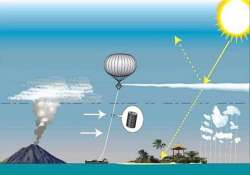Scientists To Create Artificial Volcano For Climate Change Experiment
London, Sept 15: A bizarre ''artificial volcano'' experiment taking place at a disused Norfolk airfield next month could help save the planet from global warming. British scientists will attempt to pump water up a hose suspended

London, Sept 15: A bizarre ''artificial volcano'' experiment taking place at a disused Norfolk airfield next month could help save the planet from global warming.
British scientists will attempt to pump water up a hose suspended one kilometre off the ground beneath a helium-filled balloon to gather data that could pave the way to a giant geoengineering project in decades to come, reports The Telegraph.
The long-term vision is to tether 20 kilometre-long pipes to balloons the size of Wembley stadium.
Light-scattering particles would be pumped high into the atmosphere to reflect the sun's rays and cool the earth.
The effect would be similar to that of a volcanic eruption spewing out clouds of sulphate droplets which can have an impact on the climate.
Dr Matt Watson, from the University of Bristol, who is leading the Spice (Stratospheric Particle Injection for Climate Engineering) project, said: ''This is a controversial and potentially alarming subject.
''We're going to try to pump tap water to a height of one kilometre through a pipe as a test of the technology.''
The test will take place on a disused airfield at Sculthorpe, north Norfolk, using a dirigible ''blimp'' balloon of the type commonly used to carry adverts or take photos.
Water will be forced up the pipe using an ordinary pressure pump available from hardware stores.
After spouting from the top the water will evaporate or fall to the ground as light ''rain''.
Measurements and recordings made by the scientists will help shape the next stages of the research.
Constructing artificial volcanoes to alter climate is seen as a ''last resort'' if it proves impossible to bring carbon emissions under control.
Pouring 10 million tonnes of material into the stratosphere each using 10 to 20 giant balloons could achieve a 2C global drop in temperature, the scientists believe.
Sulphate emissions from the Mount Pinatubo eruption in the Philippines in June 1991 reduced world temperature by 0.5C for two years.
Experts believe particles of clay, salts or metallic oxides suspended in liquid would prove more effective than the sulphates produced by real volcanoes.
The aerodynamically designed suspended pipes would probably be sited far out to sea.
Dr Hugh Hunt, from Cambridge University, who will head the Sculthorpe test, said: ''To pump water to one kilometre you need a pressure of 100 bar. When we start thinking about 20 kilometres we're talking about 4,000 bar of pressure. You don't get that kind of pressure at B&Q.''
Details of the three year, £1.6 million Spice project were presented today at the British Science Festival at the University of Bradford.
Dr Watson stressed that a full-scale geoengineering project would involve enormous engineering challenges, a careful analysis of the risks, and the co-operation of governments around the world.
Possible hazards included depletion of the ozone layer and unpredictable effects on rainfall.
''We are still decades away from doing this and it's not simply a science decision,'' said Dr Watson. ''There are ethical and governmental decisions around this that are huge. Just because we can do it doesn't mean that we have the right to do it.''
Despite the hurdles the scientists believe the advanced technology needed to make such a project possible is not far away.''I imagine there will be tethered balloons at 20 kilometres within the next few years,'' said Dr Hunt. ''It's tantalisingly close in quite a number of technologies.. the engineering challenge is what excites us.''